#rop meta
Text
Sauron Unchained
Remember when Sauron mentioned "THAT first sunrise," on the raft in the Vision? (Not THE first sunrise. The sun already existed. He's talking about THAT first sunrise, after Morgoth was defeated.)

"When Morgoth was defeated, it was as if a great, clenched fist had released its grasp from my neck. And in the stillness of that first sunrise, at last! I felt the light of The One again. And I knew, if ever I was to be forgiven, then I had to heal everything that I had helped ruin" (1x08).
That sunrise was a pretty big deal.
Let's review this moment Sauron describes from The Silmarillion.
(Of the Voyage of Eärendil and the War of Wrath.)
Before the rising of the sun Eärendil slew Ancalagon the Black, the mightiest of the dragon-host, and cast him from the sky; and he fell upon the towers of Thangorodrim, and they were broken in his ruin. Then the sun rose, and the host of the Valar prevailed, and well-nigh all the dragons were destroyed; and all the pits of Morgoth were broken and unroofed, and the might of the Valar descended into the deeps of the earth. [...]
Then Morgoth was bound.
[...] Thus an end was made of the power of Angband in the North, and the evil realm was brought to naught; and out of the deep prisons a multitude of slaves came forth beyond all hope into the light of day, and they looked upon a world that was changed.
Those slaves who emerged were not the servants of Morgoth (like Orcs, Balrogs, etc.), but rather Elves, the likes of Gwindor, who were captured, imprisoned and enslaved, sent deep into the mines to dig.
But Sauron described his experience from their perspective.
Sooo... why?
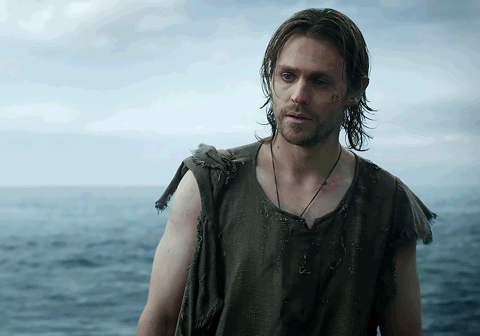
"When Morgoth was defeated, it was as if a great, clenched fist had released its grasp from my neck. And in the stillness of THAT first sunrise, at last! I felt the light of The One again."
Some complain:
Why did the writers make it seem like Morgoth made Sauron evil, against his will?
-----They didn't.-----
Why did they change Sauron's character from liking Morgoth because of efficiency, to loathing him?
-----They didn't.-----
Why did they make it so Sauron only allied himself with Morgoth in order to survive?
-----They didn't.-----
They didn't change anything. They didn't even have to add anything. None of this came out of the clear blue just for fun. It's not even just for the sake of making the show.
Sauron manipulated Galadriel, but he did so with the TRUTH, making it easier for her to pity him than if he flat-out lied.
["And in the stillness of that first sunrise..."]
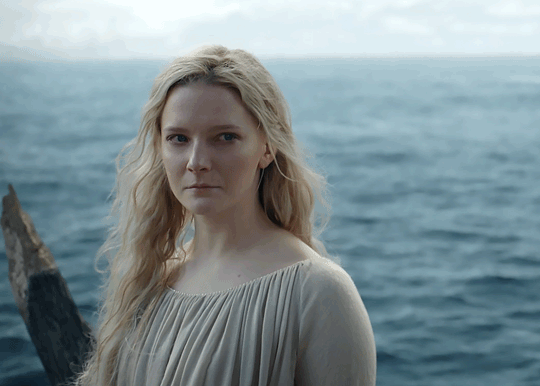
(Meanwhile, he talks about forgiveness.)
Galadriel: "No penance could ever erase the evil you have done."
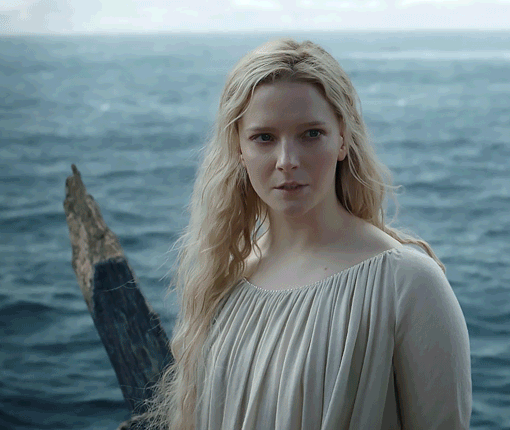
Sauron: "That is not what you believe." [...] After our victory, you said that whatever I'd done before, I could be free of it now. [...] I told you the truth! I told you that I had done evil, and you did not care! Because you knew that our past meant nothing, weighed against our future. :D"
What is this 'trauma' he allegedly experienced? Sure, he was wary of the consequences of crossing Morgoth, but I mean ... he was the guy--Morgoth's #1--his right hand Maia--his most devoted servant. He would never do anything in disobedience or rebellion. Else how would he achieve such a status?
The implication of his tale is not that he was FORCED to Morgoth's allegiance, giving him this general fear that was finally lifted when Morgoth fell.
Something happened.
He made ONE mistake.
(And since Patrick said they're not in the business of pure Easter eggs, there's a REASON they showed this.)
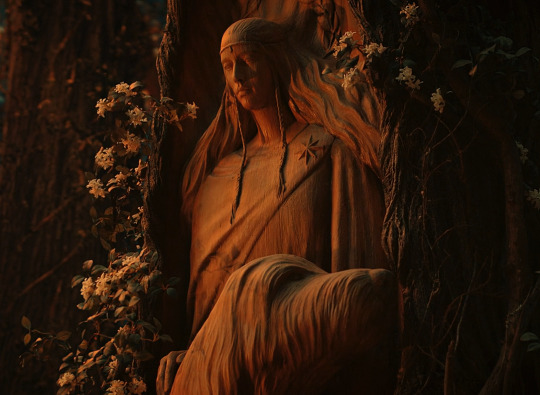
In Sauron's most humiliating moment, being in the jaws of Huan, Lúthien told him "that he should be stripped of his raiment of flesh, and his ghost be sent quaking back to Morgoth; and she said: 'There everlastingly thy naked self shall endure the torment of his scorn, pierced by his eyes, unless thou yield to me the mastery of thy tower.' (The Silmarillion: Of Beren and Lúthien).
Before that, Sauron had it all. Unbeknownst to him at the time, he already had Beren (who had a price put on his head by Morgoth) IN HIS PRISON. But hearing Lúthien sing to Beren in the hour of Finrod's death, he sought great reward for bringing her to Morgoth. When his dying servant told him that Huan was there, he was like, Oh. I got this.
Things went sideways, and he had no choice but to yield to Huan, or face Morgoth's wrath... so he let them go.
As a result, Beren and Lúthien waltzed their way into Angband, stole a Silmaril (eventually) and escaped.
So, um...?
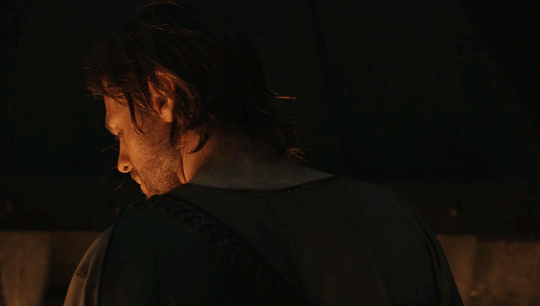
Charlie referenced what Lúthien told Sauron, when speaking about the 'clenched fist' line. His paraphrasing is quite unnerving, given that he knows what backstory we are going to see next season... and I don't know... but I would like to... and it makes me wonder.
"You can go whimpering back to your master and tell him that you've let me in. You've failed. You haven’t defended your kingdom." [...] I read from that this thing that Morgoth is so powerful and so scary, that it would've meant consequences for Sauron.
- Charlie Vickers
Where exactly was Sauron after his failure? He dwelt in Taur-nu-Fuin for a while, but a lot of time passed between then and the end of the War. So...WHERE DID HE GO? Wouldn't the most devoted and powerful of all the servants of Morgoth be actively involved in the defense against the host of the Valar?? One might say things were trending upward for him...
...until Finrod, Beren, Lúthien, and Huan came along.
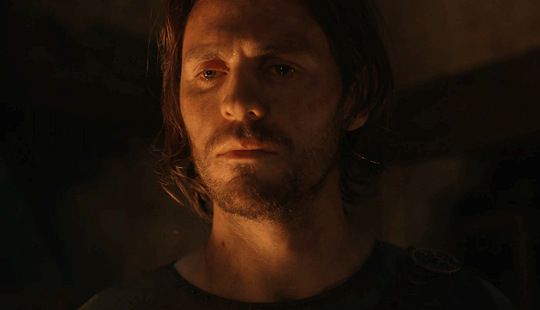
How long would it have taken Morgoth to find out that everything was Sauron's fault? How long would it have taken to hunt Sauron down, as he fled?
Not very long, I reckon.
[...] there must have been an element to their relationship where Morgoth was someone he feared at times, or someone that would punish him when he failed. [...] there must have been some truth in [the clenched fist] line.
- Charlie Vickers
No wonder he described the end of the War as if he had been among the slaves who emerged from the deep prisons..."beyond all hope into the light of day"...reminiscing the first sunrise after the overthrow of Thangorodrim, and the great, clenched fist that released its grasp from his neck as a result.
In the Great War, he wasn't just sitting in a tree, or even in a back-up tower, watching from the side-lines.
He failed Morgoth.
Miserably.
And was punished for it.
No wonder he was missing during the War of Wrath.
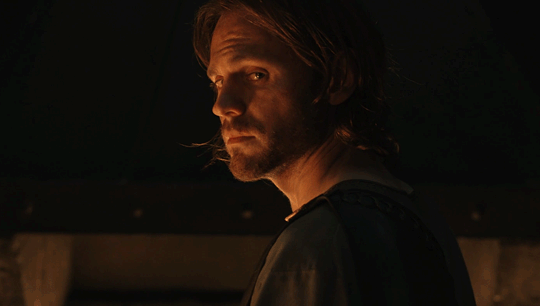
"What do you know of darkness?"
#the rings of power#rings of power theories#rop meta#sauron#lotr rop#another spontaneous post#but don't pity him#that's what he wants you to do#warning#stay away#i know it's hard#must be strong#rings of power#1x08#1x05#the silmarillion#morgoth#galadriel#charlie vickers#luthien#huan
175 notes
·
View notes
Text
i know what the lore says but ROP.... I have some questions
now I KNOW that there is no way Sauron and Galadriel ever met in Valinor as kids. I know the lore. But... the visuals of the opening scene of the show keep bugging me, especially after there were whispers of young!Mairon potentially being seen in S2.
“Nothing is evil in the beginning” is directly overlaid on a scene of a blindfolded boy who is being guided by a tapping sound from one of the children. (metaphor?)




“And there was a time when the world was so young, there had not yet been a sunrise” the camera remains focused on this boy. With reddish brown hair and light colored eyes that… well… having this boy and the young Galadriel be the first focused frames of the show is a certain introduction.
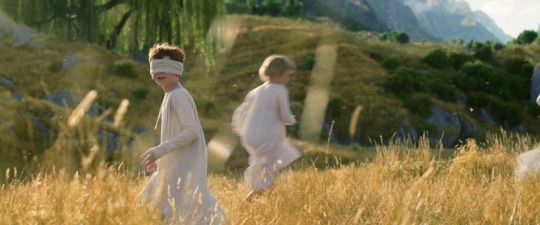

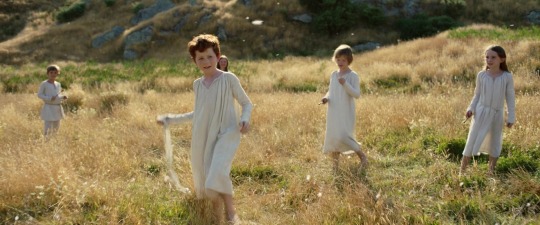
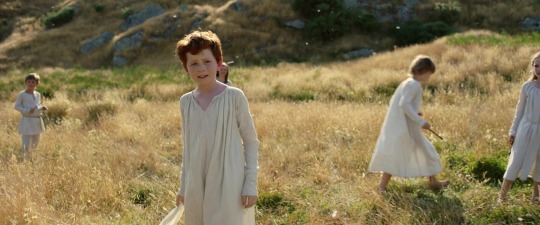
*Pause* I want to appreciate how the first thing this kid sees when taking off the blindfold is Galadriel and he gets… this expression. Like I’ve seen that expression before.


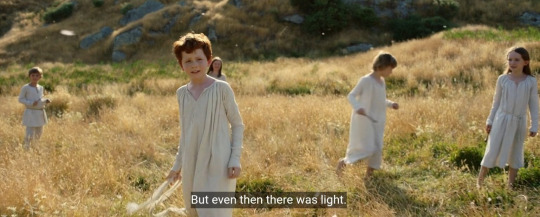
“Even then there was light,” is the voiceover when the boy looks at Galadriel and we and this boy are seeing her for the first time.


Notice how he is the ONLY one looking at her in this shot. As if he is the only one who can see her light.
As she is folding the origami boat, a young male voice is heard offscreen asking what is that. This is the second voice we hear in the entire show.
That’s alone is not what’s interesting. As the children approach Galadriel, the camera waits for the formerly blindfolded boy to peer his head around at her before switching to show Galadriel again.
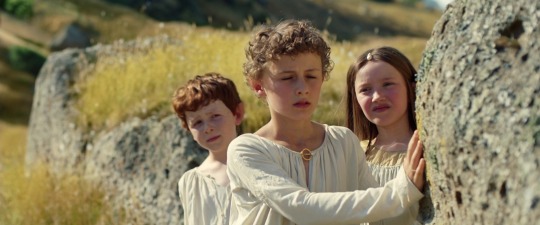

(the boy just has a bit of a wry mischevious look to his face and VERY ambiguously shaped ears... like we know Halbrand has big ears and so are this little boy's but I've not found ONE shot where they look clearly POINTED.)
But he doesn’t talk to her though, that’s reserved for the rude boy.
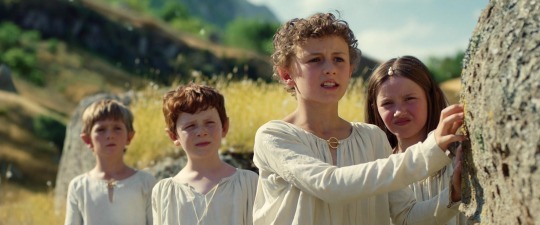

*Also* the blindfolded-boy is wearing the simplest clothing out of ALL of the children. The two other boys have gold adornments on their tunics but the reddish-brunette has nothing. It's obvious even from behind how his clothing is the plainest of all of theirs... almost like a servant.


The episode don’t show who threw the first stone (👀). Nor they don’t show which of the kids’ throws finally sinks the boat. But… the formerly-blindfolded kid is running behind the pack for the majority of the time. Meaning he may have thrown it or did he stay out of the conflict, just remaining at the fringes.

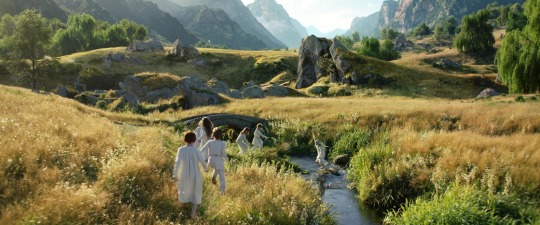
But this boy in the simple clothing loiters in the back of the pack for the ENTIRE exchange of watching her ship. Like he wants to say something to her but isn’t.

This might be nothing... but if the show-runners truly had the main idea of basing the whole show around that line in the Mirror of Galadriel...
"blinded by the darkness, her light turned away from him, but nevertheless he gropes ever to see her. But still the door is closed.”
Somehow... this boy being the first to approach her, to almost be reaching out to see what the girl is doing... nothing is accidental in film and television. Particularly in the establishing shots of the show. It may be against lore. But nevertheless even in episode 2, Halbrand's introduction to the audience is a perfect mirror.

#lotr meta#rop meta#tolkien meta#sauron#mairon#halbrand#haladriel#galadriel#saurondriel meta#martanis#haladriel meta#mairon meta#rop#rings of power#rings of power meta
273 notes
·
View notes
Text
I haven't seen anyone else talk about this so I will!!
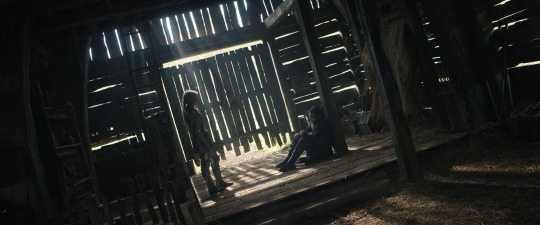
I love this shit! In this shot, you can clearly see the camera frame is not horizontal to the ground. Here it is again with a guideline incase I’m not making sense ↓
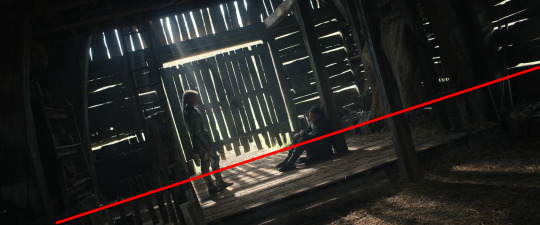
This is called a Dutch Angle. Lots of film-type people don't like them because they can come off as amateur-ish. But, when used intentionally and sparingly, it can add so much depth to the story.
I’m still working on my second rewatch of the show, but I'm pretty sure this is the only scene in the whole show where they use dutch angles. And in this scene, they use them for every

Single
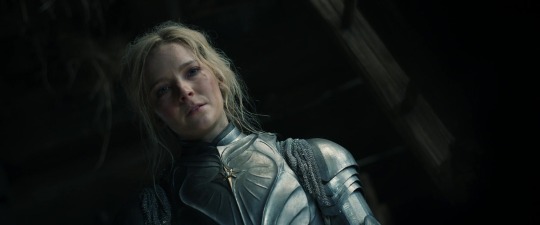
Shot
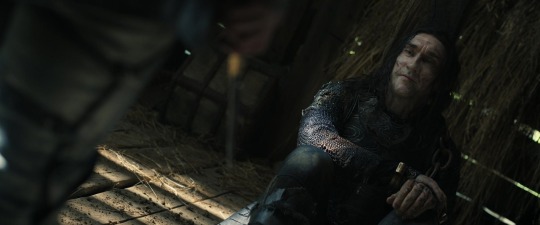
All
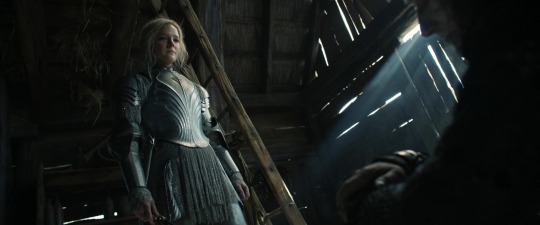
Of
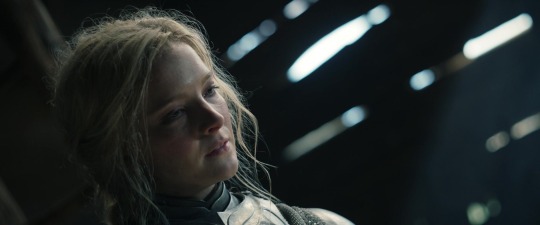
Them

Even Halbrando gets one!!
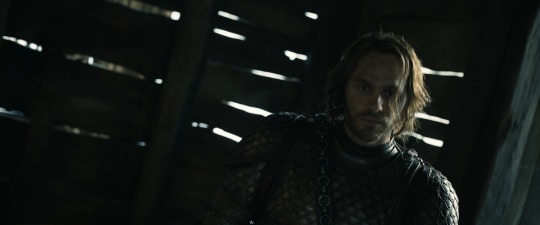
BUT WHAT DOES IT MEAN??
Usually, Dutch angles invokes some sort of change from the previous scene/shot/whatever. The best example I can think of is in The Magicians. Every time the characters go the the Library (read: a very mysterious/sinister place), everything is shot on Dutch angles. Its very subtle storytelling. Most people I know who have seen The Magicians didn't notice this until I pointed it out to them. But it totally adds to the overall "something here is off" vibe without being super on the nose.
The dutch angles here in Rings of Power are doing the same thing. But it is slightly differnt. It is not the setting that’s weird or sinister. The barn doesn't has "something is off" vibes. It's Galadriel! Galadriel's vibes are off!!
There has already been so much said about Gal's emotional state in this scene. Baby girl is not okay! She is clearly in crisis and has become detached from the values that have guided her whole life. You could say her perception of the world and of good and evil has Tilted.
I just wanted to point out this little detail because I am very passionate about visual storytelling. That is all!
151 notes
·
View notes
Text
Do Sauron and Galadriel already have their own theme?
Alright my fellow Rings of Power soundtrack nerds, this one's for you.
I noticed there's a beautiful, tragic motif that appears twice in the music behind two of Galadriel and Halbrand's major scenes, in suspiciously similar places in the narrative:
Firstly in the cells in Númenor, when Galadriel first encourages Halbrand to take up his crown, looking something like this in F minor*:
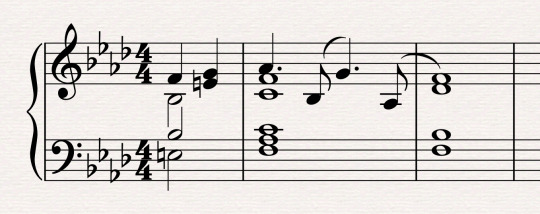
(soundtrack for Episode 3: Adar, Both Our Bloodlines, 00:36-00:52)


And secondly (you'll never guess where), during the log scene after the battle, developed further in Bb minor:

(soundtrack for Episode Six: Udûn, Transformed By Darkness, 05:34-06:09)


Knowing how fastidious Bear McCreary is with this score, which is filled to the brim with masterful uses of leitmotifs, and the immense care he took developing those melodies, I have a very strong (and hopeful) suspicion this is another.
But what does this theme signify? Is it Galadriel and Halbrand/Sauron's present/future love theme? Does it refer to the tragedy of their partnership, in whatever form that partnership takes? Or is it Sauron's theme alone, colouring the tragedy of a fallen Maia trying desperately to seek peace and redeem himself?
In favour of being their theme in some way, there is:
Shape of the melody: the leaping 6th intervals closely resemble, or at least echo, Bronwyn and Arondir's wistful and moving love theme, with its longing and impossibility (for them, Human and Elf relationships; for Galadriel and Sauron...)
Timing: the first instance of this motif lands perfectly behind Galadriel's words 'for you are him' (a double entendre), followed by Halbrand's 'That's an odd thing to say to a man in a cage'. The second instance is even more strongly linked to their relationship, coming directly after the dialogue:
'If I could just hold onto that feeling, keep it with me always, bind it to my very being, then I...'
'I felt it too.'
Or, only the most romantic (or cosmic) moment between them in the series.
What do you think? What might these moments and this theme symbolise narratively? Is there anywhere else in the score you can hear it?
(And Bear McCreary, if you happen to read my humble theorising and are at liberty to confirm either way, or to offer enlightening words of wisdom, please do. If not, keep it up. We love your work.)
________________________________________________
*I've done my best at transcribing the harmonies but do not claim perfection, and similarly the rhythms are indicative sketches only. Hopefully I'm right and Bear will give us the official version in a blog post some day. All copyright lies with the composer. I also may update this with more meta or thoughts later.
#the rings of power#the lord of the rings: the rings of power#rings of power#trop#trop meta#bear mccreary#composition#galadriel#halbrand#sauron#haladriel#saurondriel#galadriel x halbrand#halbrand x galadriel#rop spoilers#trop spoilers#rop meta#rop#film scoring#musing music things
147 notes
·
View notes
Text
i am so so relieved about rop celebrimbor. it isn't the celebrimbor i'd have cast or written myself, but it's still him. rop celebrimbor has so much of what i loved about tolkien's celebrimbor, all the complicated history, all the indiscriminate curiosity, all the big ambitious dreams of a better world, all the awful inevitable tragedy.
the promotional material has talked about him as ambitious, and he clearly is, but the show makes it clear that it's not a straight-forward ambition for power or prestige. it's an ambition to create, to build, to bring beauty. it's an ambition that is expressly tied-up in righting the wrongs and the devastation of the war.

he says "our kind" but we all know that for celebrimbor it's far more personal than that. his father, his uncles, his grandfather, his close family brought war to these shores. the show frames his desire to create beauty as explicitly about countering the harm done by his family.
earlier in the show, arondir talks about how closely elves link together healing and beauty.

when celebrimbor says he wants to fill the world with beauty, it's very easy to read that as wanting to bring healing. in the manner of the elves, he wants to heal the harm done by his kind, by his family. that's all in his first scene, and that sets up a really promising version of celebrimbor!
and if we're talking about firsts.... his very first words are:

that's perfect. that is exactly the kind of lofty, doomed tragic sentiment i would expect from the last son of the house of feanor.
141 notes
·
View notes
Text
Okay so it turns out I have a lot of opinions about how rings of power are treating Celebrimbor.
We all know that the age and the crushed velvet curtain gown is wrong and upsetting visually, but it actually ties into something that I think is a symptom of a fundamental misunderstanding of Celebrimbor as a person and his narrative role.
Celebrimbor's story is a tragedy, not in the way that his father and grandfather's story is a tragedy, because they were bound up in the consequences of their own bad decisions, but because Celebrimbor wants to do good.
He wants to restore, to preserve, to undo the marring of Arda and his own family's terrible impact. Instead of being suspicious like Feanor, he is trusting; of the dwarves, of Annatar. Instead of being exclusionary and driving all good people away like Curufin, he shares his knowledge and works with the dwarves in friendship.
Celebrimbor is a symbol of youthful idealism, of the hope of new generations. Celebrimbor knows his legacy is grand, but he uses it to make gateways and forge bonds, not wage war.
The terrible tragedy of Celebrimbor's story is that he trusted too much. That even when he tried to be something good, it wasn't enough.
It was a mistake not to make Celebrimbor the main character in the series and it was a mistake to make him seem like an old, awkward specialist on the sidelines, while Elrond gets the bulk of his footwork in season 1.
It erodes Celebrimbor as a narrative symbol in a way I don't think they can recover.
84 notes
·
View notes
Text
Is Theo stamped for evil??
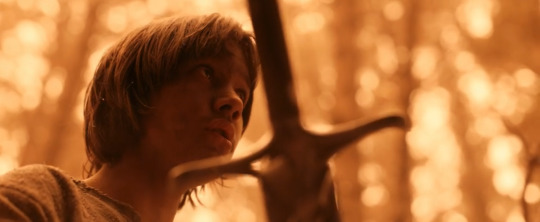
So, I got a reply on one of my Theo posts, and I figured I'd write a new post to compose my thoughts on this, as I've been meaning to write some Theo meta and put it in the tag! I don't mean this as a targeted reply, but just a general response to the very predominant fandom theory that says Theo is destined to be a Nazgul, or even the Witch King Himself. While I'm not inherently opposed to this theory -- I love tragic arcs and it certainly could work for me if executed well -- I'm simply not in agreement with the overwhelming fandom consensus that Theo is Definitely Stamped For Evil. I just don't see it!!
So, let's discuss!
Here’s a list of pretty much everything Theo does sequentially in Season 1:
Complains about having to help his mom when he didn’t get any sleep
Expresses some grumpiness about his mom having a boyfriend
Steals something from a very mean, objectively evil old man
Has a bitchy dynamic with his best friend, also an (older?) teenaged boy
Gets triggered by the annoying “mice” and smashes the floorboards with a poker (I’m sorry but this is the most relatable thing he’s ever done)
Puts himself in harm's way to help his mom fight off an orc, including jumping off of a loft to try to strangle the orc in a noose
Goes with his mom to the tower and helps her support the refugees there
Offers to go into town to get more food so that his people don’t starve
Goes back for more food at risk to himself
Tries to lie to aforementioned objectively evil old man about stolen sword, fails because he’s a terrible liar
Resists recruitment by evil old man, stays with his mom even when others are choosing “evil”
Tells Arondir (a person he doesn’t fully trust and who he has very conflicted feelings for) about the sword (something he has a visceral attachment to). He literally gives Arondir the hilt. He literally did that.
Spies on Arondir when he’s hiding the hilt
Helps defend and protect the helpless amongst his people during the orc battle, takes his job very seriously
Helps save his mother’s life during emergency surgery
Surrenders the hilt to Adar in the hopes that it will save his mother’s life (the person he almost just watched die) and the rest of the people in that room
Looks up to and idolizes Galadriel, a powerful figure of “light” (who is of course also conflicted)
Admits his own guilt and weakness to Arondir
Feels deep grief for the loss of his homeland, wants to kill orcs in revenge
Feels deep guilt and personal responsibility for the loss of his homeland, admits his guilt to Galadriel
Accept’s Galadriel’s sword, cherishes Galadriel’s sword
Worries and grieves deeply for his mother, Arondir, his friends, his people
Refuses to bow to or chant for Halbrand when he is named King (you know, the guy who’s literally Sauron).
In his last shot of Season 1, we see Theo holding Galadriel’s sword high and chanting “Strength to the Southlands!”
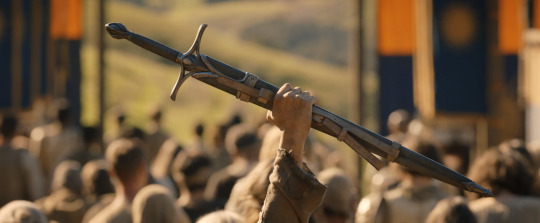
I apologize for this ridiculous and pedantic list, but I think it's helpful to see all of his actions. What this list demonstrates for me most of all is that Theo is complex! He makes some bad choices throughout the season and occasionally behaves petulantly, but he also does many brave and selfless things and demonstrates some real strength of character. I simply do not see this characterization as definitively signaling a future villain, especially when our primary protagonist and Confirmed Force for Good Galadriel also displays similar flaws, complexities, and failures of judgement. That's just good character writing, it's not necessarily villain-signaling.
I also think it's impossible to assess Theo's behavior without examining the effect the sword hilt might have had on it. We know from Theo's own words that the hilt made him feel powerful and important, and if the hilt has any of the qualities of one of Sauron's future experiments, then it's safe to say it could have a will of its own! It might, for instance, have a desire to be found! We know it was hiding in Waldreg's barn for who knows how many years, which seems like a good place for it to be, given that Waldreg was 100% willing to give it over to Sauron or even just someone who kind of reminded him of Sauron at literally the first opportunity. So it's pretty clear that even if Theo wasn't involved, the hilt would have found its way to Mount Doom.

Once Theo does have it, however, it's possible the hilt was prodding him into certain actions and behaviors -- for instance, going down into the village where the orcs were hunting for it and staying behind to look for more food, even though it was somewhat reckless of him. After he surrenders the hilt to Arondir, the influence still lingers -- he spies on Arondir when he's hiding the hilt, allowing him to later reveal it to Adar. I think there's a case to be made that Bronwyn is also affected by the hilt. As soon as she comes in contact with it, she makes a complete 180 on her original stance and decides the only way to survive is to surrender the hilt to the enemy. Of course, Arondir talks her off this ledge (and also takes the sword hilt back from her -- yes I have analyzed this blocking), after which they come up with a better option. All in all though, some very sketchy behavior from the hilt.
What is particularly notable about all of this is that Theo, despite the ring-like influence this sword might be having on him, does willingly, of his own volition, from the depths of his own conscience, surrender the hilt to Arondir! He makes the decision to do that and has the strength of will to follow through on it, even though Arondir is not (!!) his favorite person at that point! Like! What's not clicking! That's some heroic-ass behavior!!

There's certainly a case to be made that Theo is tempestuous and moody (as are all teenagers), but I also disagree with the assessment that his mother is the only thing holding him to the side of good, and that the show will kill her off to trigger his descent into evil. Sure, the season spent some time on the relationship between Bronwyn and Theo, but I would argue it spent *more* time on the relationship between Theo and other powerful characters, specifically Arondir and Galadriel, both of whom have had a very positive influence on him and could be anchors for him even if his mother was not around. It also demonstrated the care he has for his people, that the Southlands as an idea or an identity remains important to him and something he is willing to fight for.
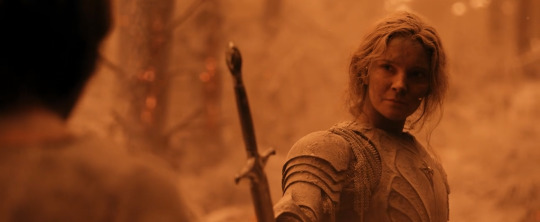
To be clear, I am not saying he won't become a Nazgul - literally anything is possible! I'm also not trying to defend him because he's one of my faves and I don't want him to be evil (I enjoy villains so this is a non-issue for me!!). I simply do not think the character choices are clearly pointing to this arc for him. The showrunners have said that he could go in many different directions, and if he is going to be a future canon character, my money is currently on the King of the Dead. This would still be a tragic arc, of course, but in my opinion, it aligns more clearly with what we've seen of Theo. I could imagine him finally creating a home and a kingdom for his people (with the help of Bronwyn and Arondir of course), only to be unwilling to surrender this safety when the time came, at the expense of his honor. (See italicized bit above about Theo refusing to bow to Halbrand -- interesting character detail for sure!) The people who became the Army of the Dead were also guilty of worshipping Sauron, but given that this is already part of the Southlander's arc in the Ring of Power, it feels like a good fit in hitting the broad strokes of that canon story.

I also simply think this would be a more humanistic and empathetic story, which -- at the risk of sounding overly optimistic or polyanna-ish -- does seem to me to be the lens through which the writers are approaching these characters. In general, the character writing in the show feels much more interested in slow development, rather than shocking twists that force dramatic character arcs. They would have to start making some very different choices for me to be convinced that a horrific death for Bronwyn as a means of motivating Theo's villainry was territory they were interested in treading.
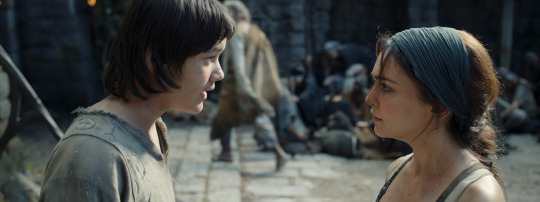
Finally, I just want to address the Nazgul guessing game in general, because I'm not sure I'm on the same page as the rest of the fandom with some of these assumptions. While it's certainly fun to imagine who might be a Nazgul, I think it's pretty silly to assume we will intimately know every single one of the Nazgul as POV characters, or that all such characters have already been introduced. That would be some exceptionally redundant storytelling! Even just showing one or two characters take that journey would be enough to effectively suggest the rest. The idea that half the Numenoreans and most of the prominent Southlanders are already destined to be Nazgul just seems very unlikely to me.
Okay, I'm gonna shut up now. I hope you enjoyed this post and I'd love to hear your Theo thoughts!! But please do note, boring-ass Theo slander will be unpolitefully ignored :) :) :)
56 notes
·
View notes
Text
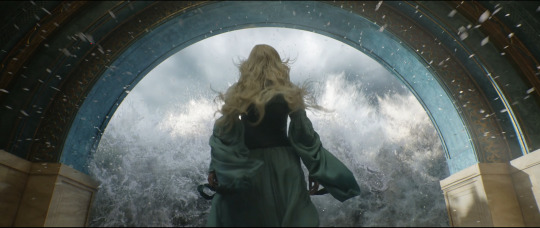
I wonder if Galadriel seeing the great wave destroying Númenor through the Palantir would at all be foreshadowing for future seasons of Rings of Power for herself directly?
Would that be interesting divergence for Galadriel to actually be IN Númenor during the Akallabêth? I know this is unlikely but we have no idea what Galadriel will really be doing in later seasons. In the books Tolkien couldn't make up his mind and then doesn't mention her at all really in the War of the Last Alliance.
Could her hunt for Sauron lead her to chasing him to Númenor?
In the Palanatir scene we hear:
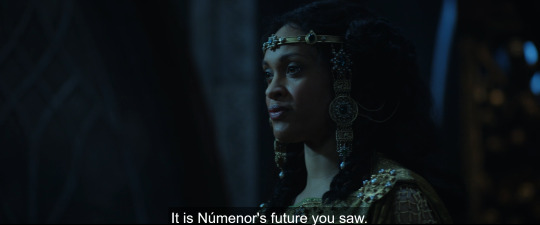
Tar-Miriel: It is Númenor 's future you saw
Galadriel: Palantiri show many visions. Some that will never come to pass.
Tar-Miriel: It has already come to pass. The vision begins with your arrival

Clearly Galadriel's arrival is connected with the vision of Númenor 's downfall and that's nowhere in the books but makes a nice connection of Galadriel to Númenor fate. We assume ROP will depict the downfall of Númenor and not give them a happy ending, so would Galadriel be tied up in that?
If she is there during the downfall. How could she be saved? A Great Eagle? Another raft?
#galadriel#rop#rings of power#the rings of power#rop predictions#numenor#speculation#miriel#queen-regent miriel#rop meta#meta
12 notes
·
View notes
Text
It’s also interesting to think about how in the forest chase scene it’s so easy to see halbrand as a noble victim and Adar as a monster because THATS HOW SAURON DESIGNED IT TO BE! Sauron can take on a fair form of beauty and be seen as good and human while adar has been stripped of his elven fairness and will be painted as a monster even though adar still retains a great deal of his elvish nature while Sauron at this point is already internally monstrous and I think that’s just so fucking tragic
9 notes
·
View notes
Text
On the name“Halbrand” (from a German perspective)
“Halbrand” is not a German name, even though it could very well be from the sound of it. There is for example a name “Hildebrand”, sometimes “Hilbrand”. I’ll get back to that one!
In German, you can split “Halbrand” either into the syllables “halb” (= half) and “rand” (= edge), which makes only little sense though, or in “hal” and “brand” - which works almost too well, as you will see :)
“Brand” is really simple - it just means (a big and destructive) fire in German.
“hal” is a bit trickier, for it has no direct equivalent in modern German. But if you go back to Middle High German (spoken during the High Middle Ages), you get “hal” (= shell) and “hæl(e)“ (= hidden, kept a secret, dark, but also smooth, slippery, slick).
Related to / descended from those are modern German “hohl” (= empty) and “ver-hehl-en” (= hiding something, keeping something a secret). Also related is German “Hölle”, which means “hell” - and probably also German “hell”, which means “bright” ...
I am by no means claiming that the writers checked their name of choice for the character in all possible languages, but considering how fitting it is, they might as well have. My guess would be German being rather closely related to English and its predecessors (of which I have absolutely no knowledge btw) having contributed to “Halbrand” matching Sauron in disguise perfectly (also) in German.
To sum it up, “(Middle High) German Halbrand”, if I may say so, is hidden fire, secret fire, fire in a shell, (maybe) bright fire or hellfire. Btw, “hellebrant” (= hellfire) even has its own entry in Lexer and BMZ, two big dictionaries for Middle High German.
*insert gif of Claude Frollo hellfiring here*
And there is even more: Not in modern, but in Middle High German “brant” can also mean “sword”!
Which brings us back to Hil(de)brand: Originally a surname, it is now also (and mostly) a family name. “hild” comes from Old High German “hiltja”, meaning “fight” (and as such has little to nothing to do with “hal”). But the “brand” in “Hildebrand” does in fact mostly refer to “sword”, the whole name usually being translated/interpreted as “fighter with a sword”. As such it is linked to nobility and knighthood, and some even connect it to blacksmithing! Keep in mind though, that the average German speaker (myself included), has to look all this up.
As for the fictional name “Halbrand”: I (and I guess many German speaking viewers) only got/get the “brand” (fire) part, if at all, because it is a common word in modern German, and fits with Halbrand’s “homeland” apparently being in ashes, maybe with him being a smith. Simple!
But if you look closer - and of course restrospectively ;) - there is more to it. The name “Halbrand” for Mairon/Sauron now seems at the same time subtle and not subtle at all (once bright flame, future Lord of a hellish landscape ...), which befits the character’s hidden/not really hidden and slippery nature perfectly.
#Rings of Power#halbrand#Sauron#mairon#rop meta#spoiler#spoilers#rop spoiler#rop spoilers#post of mine
24 notes
·
View notes
Text
SAURON REBUILT
I cracked the code.
Sauron was rebuilt at the end of the first season. But HOW did he rebuild his power?
Think about this:
Who/what brought Sauron low in power?
Did he just wait things out, and let himself naturally rebuild?
What was required for him to rebuild his power?
The same questions may be asked for the Third Age (LOTR).
Why did Sauron have to rebuild his power?
Why was he incapable of naturally rebuilding over time?
What was the one thing he needed in order to rebuild?

First...
TIMELINE
J.D. and Patrick have not changed the timeline as much as so many assume. It is not jumbled, and it is not even compressed in the way that is widely accepted.
"What was important to the Tolkien estate was the principle of the narrative flow and the sequence of events, not the dates. The rings are made here, there's a war between Sauron and the elves after that, a later Sauron is taken to Númenor, Númenor falls, Gondor is established, and you end up with the Battle of the Last Alliance. Does it matter if a hundred or 500 years passed between those events? No" (Patrick McKay).
The "time compression" simply entails shifting the events that Patrick listed to the end of the Second Age, instead of spreading them out over three thousand years. Everything else stays the same. The anchor point is the Forging of the Rings, and every major event (which Patrick mentioned) would naturally follow suit—that is what they compressed. The actual duration of the Age has not changed.
We did not meet Sauron at the beginning of the Second Age, but at the tail end of it. (Sauron did not go sulk on a raft right after saying sorry to Eönwë; that obeisance was thousands of years ago.)
"Year gave way to year. Century gave way to century. And for many Elves, the pain of those days passed out of thought and mind" (Galadriel, 1x01).

"For, though Morgoth fell an age ago, some feared a new evil might arise from his shadow. So, for centuries now, these soldiers have swept across crag and crevice..." (Gil-galad, 1x01).
So, how much time passed between Adar's betrayal in Forodwaith and the raft? Thondir answers this question in the first episode:
"Surely it is lost to the ages now. Whatever happened here was long ago. [...] The mark is centuries old! Whoever left it could be long dead."
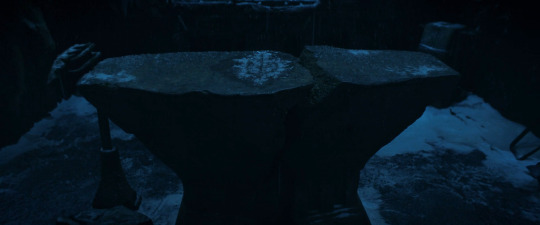
Even Charlie specified when Sauron was brought low, in his Deadline interview.
"At the beginning of the Second Age, [Sauron had] been brought low, and he lingered in Middle-earth, and his power then very slowly reemerged."
Sauron's weak and infirm state on the raft had been his lot since the beginning of the Second Age, which was millennia ago. If all he had to do was wait for his power to reload, why did we meet him at the same level to which Adar brought him centuries before? If his power grew naturally, we would have seen a much more powerful Sauron at the beginning of the season. Instead, Galadriel found him at his lowest state. And although he was at rock bottom for so long, he was REBUILT in a matter of months. How?
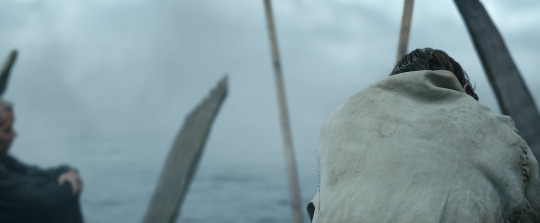

He was not able to rebuild his power until he met Galadriel, and he was not even fully rebuilt until Eregion. And it could not have been anyone's sheer presence that magically restored his power. He had to actively rebuild. The signs of his rebuilding lie in two scenes that I have talked about before.
But let's jump ahead to a time/story we are more familiar with.
REBUILDING IN THE THIRD AGE
Sauron was "brought low" in the Battle of the Last Alliance. The one thing he needed in order to regain his power in LOTR was the One Ring, which he sought for three thousand years.
"These Rings have a way of being found. In evil hands it might have done great evil. Worst of all, it might have fallen into the hands of the Enemy. Indeed it certainly would; for this is the One, and he is exerting all his power to find it or draw it to himself" (Gandalf, The Lord of the Rings [FOTR]: The Shadow of the Past).
Whoever had it in their possession would cherish it to the point of obsession, but "a Ring of Power looks after itself," Gandalf said. "It was not Gollum, Frodo, but the Ring itself that decided things. The Ring left him." Sauron was "calling" the Ring to him; it wanted to be found and to return to its master. Pretty much all Sauron had to do was touch it, and he would be rebuilt.
Tolkien said in one of his letters:
"While [Sauron] wore [the Ring], his power on earth was actually enhanced. But even if he did not wear it, that power existed and was in 'rapport' with himself: he was not 'diminished.' Unless some other seized it and became possessed of it. If that happened, the new possessor could (if sufficiently strong and heroic by nature) challenge Sauron, become master of all that he had learned or done since the making of the One Ring, and so overthrow him and usurp his place. This was the essential weakness he had introduced into his situation in his effort (largely unsuccessful) to enslave the Elves, and in his desire to establish a control over the minds and wills of his servants."
So, in the event that he retrieved the Ring, he would be able to take it off without losing any of his power. But someone sufficiently strong and heroic by nature could get ahold of it and challenge him.
REBUILDING IN THE SECOND AGE: Power Storage
His attempt at rebuilding his power in the Third Age (though unsuccessful) was exactly the same as his (successful) attempt in the Second Age. Most of his power was in the One Ring, and he needed it back in order to rebuild. That means that in the Second Age, his power was stored somewhere else. He needed his power back, so where was it stored?
Keep in mind what he was doing in the North. He meddled with the powers of the Unseen World, in an attempt to find a way to craft the same power that would later make up the One Ring. He could not find the "shadow of dark knowledge," no matter how much blood he spilt in its pursuit, and Adar betrayed and split him open. (I firmly do not believe Adar killed him/separated his spirit from his physical form. My reasoning for that is on its way.)

If Sauron tried to craft the same power in the North as what he later crafted in Mordor (after finding the shadow of dark knowledge), chances are high that he successfully channeled a portion of his power into whatever he was using. That thing would be MITHRIL (evident by the above depiction of a Balrog, which was shown as Adar spoke of Sauron's experiments). But Sauron was split open by Adar and incapacitated before the work was able to continue, and his plans were forestalled.
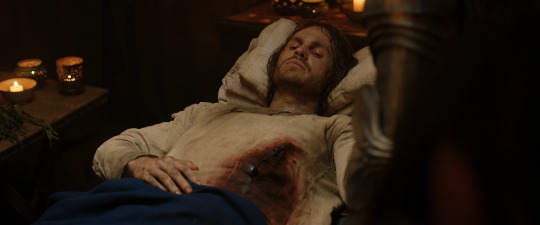
In the meantime, he did as Galadriel suspected: "[...] lying in wait, gathering strength, perfecting whatever dark art eluded him here." Mithril did not contain all of his power. There is another object which contained the other portion.
We know with certainty that Sauron had been seeking for this power when Finrod died, long before Morgoth fell.
Galadriel: "No, you died along with countless others because of him."
Sauron, as Finrod: "No, Galadriel. He was seeking a power. Not to destroy Middle-earth, but to heal it, just as your fellow-Elves are seeking to do this very moment" (1x08).
In Sauron's tower, Finrod and his company were stripped of all their possessions, then thrown into the pits, where Finrod died. Is it not logical, then, that Sauron was aware of the dagger? Sauron didn't know Finrod's identity, but perceived him to be a Noldo of great might and wisdom, "deemed that in him lay the secret of their errand," and purposed to keep him alive longer than the rest. But after Finrod gave his life for Beren, what was Sauron to do?
In order to perfect an art, it must be practiced. If the art he desired to perfect was for the express purpose of enslaving the Elves, he would not leave the dagger of a great and mighty Noldo untouched. If presented with the opportunity, he would want a prototype. When Galadriel first took the dagger, in no world are we to think that the hand of Sauron never touched it, especially since we know that it was he who marked Finrod's flesh—likely with the dagger.
"But Sauron found him first, and marked his flesh with a symbol—one whose meaning even our wisest could not discern."

Long story short, Sauron channeled a portion of his power into the dagger around the time of Finrod's death, as a prototype—a tab to allow him access to the Elves. It so happens that Finrod's sister was the one to receive it, and she immediately became obsessed with finding Sauron. Later, another portion was harnessed in mithril, right before Adar betrayed him. Both circumstances are the first two test runs of channeling his power into an object. He will later succeed in harnessing most of his power in the One Ring.
REBUILDING IN THE SECOND AGE: Power Retrieval
—THE DAGGER—
The Ring was called "mine" at least 9 times in LOTR (excluding "ours" or "my own"), by Frodo, Bilbo, Gollum, and even Boromir. When Galadriel first took the dagger, she said:
"And there, in the darkness, his vow became mine."

That moment, long before Morgoth fell, and literally millennia before she was in Forodwaith, marked the beginning of her obsession, "which character after character in the show tells her is not a good thing," said Patrick McKay. "Is [Sauron] calling her to him?" — YES! ("...he is exerting all his power to find it or draw it to himself.")
------sidenote------
Yes, Galadriel cherished the dagger because it once belonged to her dead brother, but throughout the season, we saw many indications that her attachment was a bit more peculiar—feel free to look back at every scene with the dagger; particularly...
- The mutiny scene (1x01)
- The Boat scene (1x01)
- Galadriel waking up on Elendil's ship (1x03)
- "Whose dagger was it, Galadriel?" (1x05)
- Galadriel's conversation with Adar (1x06)
- Her conversation with Sauron on the log (1x06)
- "These lands are dead," with Theo in Mordor (1x07)
- The entire Vision Sequence (1x08)
- True Creation Requires Sacrifice (1x08).
------
Sauron had many reasons for calling Galadriel to him, but a major reason was obvious: his power had been diminished, and the dagger contained a portion of it. He needed it back, so just like with the Ring, he exerted what power he had to draw the dagger, and its possessor, to himself (see Chapter 4). Sure enough, when Galadriel met him on the raft, he was very run-down.
...then he found the dagger.
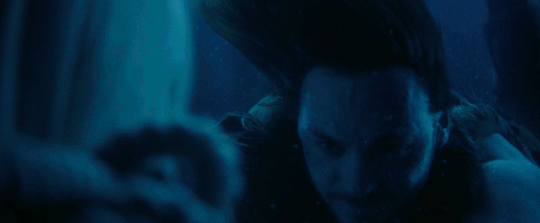
The last we saw of him in episode 2, he was resting.

Suddenly, his whole personality, demeanor, energy, physicality—his whole BEING changed in episode 3. He was no longer weak and bitter, but spry and lighthearted. What was behind the sudden rejuvenation?
He got the dagger back.

He retrieved that portion of his power, but the portion was small—only enough for him to get by, and keep Galadriel under his thumb by returning the dagger. Remember, he was able to take the One Ring off without being diminished; he would be able to part with the dagger because the power still existed and "was in 'rapport' with himself." However, if the hands of a naturally strong and heroic person obtained it, he could be challenged. Therefore, before he let go of the dagger, he parted with Galadriel on the following terms:
"And at the very least, do try not to make any new enemies."

—MITHRIL—
Celebrimbor's ambition was pretty strong in the beginning. He desired to craft something of real power, which motivation led him to believe at least two untrustworthy tales. In the same manner that Galadriel's one-track-mindedness was augmented by means of the dagger (especially after Sauron returned it), Celebrimbor was influenced by mithril (especially after Sauron returned it).
Charlie confirmed that Sauron injured himself in order to be taken to Eregion "because he understands that the only way he can be healed is through their power and magic." After the eruption, why would that be the only way for him to get things going?
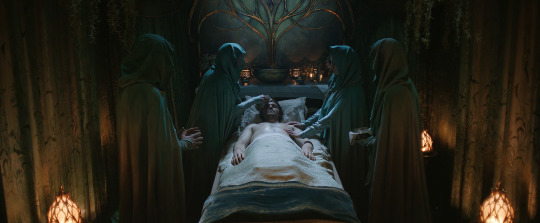
Because the mithril contained the other portion of his power, and he knew exactly where that scrap was. He touched it, regained the remainder of his power, and gladly returned the scrap to Celebrimbor, saying:
"Call it a gift."

From there, Sauron kept Celebrimbor under his thumb.
Galadriel: "Those words. 'Power over flesh.' Where did you hear them?"
Celebrimbor: "Uh... I was conferring with my smiths, I think... No, I believe those are my words."
Galadriel: "Was Halbrand with you?"
Celebrimbor: "What's it matter? It's over" (1x08).
CONCLUSION
THAT is why those two scenes were so similar.

They were not mere representations of him transferring his power into the objects, like I believed, but rather a sign that he was taking it (of course without removing it from the object). They were signs to the audience of how he was rebuilding his power—a precursor of his attempt to rebuild in the Third Age by means of the One Ring!
Let's answer the questions we asked at the beginning.
In the Third Age (LOTR)...
Why did Sauron have to rebuild his power?
- He was "brought low" in the Battle of the Last Alliance.
Why was he not able to rebuild his power naturally?
- Most of his power and essence were stored elsewhere.
What was the one thing he needed in order to rebuild?
- The One Ring.
In the Second Age (TROP)...
Who/what brought Sauron low in power?
- Adar, towards the beginning of the Age.
Did he just wait things out, and let himself naturally rebuild?
- No. He had to actively regain his power.
What was required for him to rebuild his power?
- The dagger and mithril, in which his power was stored.
The dagger and mithril are inseparably connected because both contained the two required pieces of Sauron's craft. That is why the only thing that could be alloyed with mithril was the dagger. The Three Elven Rings were never touched by the hand of Sauron, but the power within the elements that made them was Sauron's. That is why the Three are subject to the One.
Below are a couple of interesting patterns.
STRENGTH
—After the Dagger—
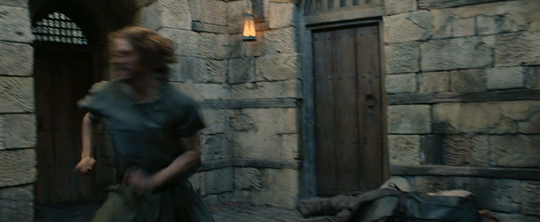
—After Mithril—

(Notice that after the dagger, having only the smaller portion of his power, he still exerted some effort in subduing four Men (I mean, he still broke an arm in a manner that J.D. suggested was superhuman); whereas after touching the mithril, having all of his power back, he not only effortlessly stopped an Elf, but warped her mind.)
FACE
—After the Dagger—
"It's not poison, if that's your concern. Not for humans, anyway."

—After Mithril—
"You believed in me. You saw strength in me. You pushed me to heights that no one else could have. I will never forget that. And I'll see to it that no one else does, either."
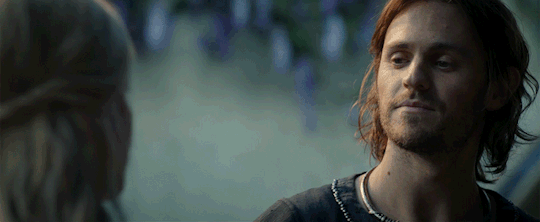
(Those were the first suspicious smirks he gave to Galadriel after he touched the dagger and mithril.)
(And this is the last smirk we see of him, when he is officially rebuilt.)

#trop meta#sauron#rop sauron#rop meta#rings of power#in the 9 months i have continually wracked my brain#in an attempt to discover exactly what sauron was up to in season 1 and before#how did i miss this?#how did i miss the connection with the one ring?#the ONE RING#like OF COURSE everything would be connected to that#it's called THE RINGS OF POWER#man#i need help#brought to you by chapter 6#chapter 6#patrick mckay#gil galad#thondir#morgoth#galadriel#halbrand#tolkien's letters#tolkien#gandalf#the fellowship of the ring#book quote#balrog#dagger#mithril
41 notes
·
View notes
Text


masterclass in casting
Artanis // Galadriel // Lady of Light
Mairon // Halbrand // The Dark Lord
(because yes, I'm always going to be a kid scene truther. And I think we all forgot that Sauron appeared in The Hobbit films.)
“Sauron appears as the Necromancer in Jackson's The Hobbit film adaptations, where he is voiced by Benedict Cumberbatch.”
#rings of power#rings of power cast#lord of the rings#lord of the rings cast#tolkien universe#lotr meta#rop meta#trop meta#tolkien meta#sauron#mairon#halbrand#haladriel#galadriel#saurondriel#saurondriel meta#martanis#haladriel meta#mairon meta#rop#rings of power meta
44 notes
·
View notes
Text
Rings of Power Analysis part #6
Elrond and Galadriel as they relate to the Khazad-Dûm and Númenor storylines
Both are elves, though Elrond is on the young side. Both have come out of a war where they lost their most important people and had to move forward. Both are still affected by their losses. Both have one grief they have talk about (finrod and earendil ) and one that’s too close for words for much of the season ( celeborn and Elros).
Both come to the kingdoms in their plot lines needing something and are met with resistance and I’m not repeating the opening monologue but that. All of that.
The differences in the kingdoms work well with the differences between our elves.
Númenor in its decline gets a Galadriel who’s been forcibly retired. Both have fallen short of their best selves by shutting out people who might have helped. Both tend to rewrite the story of the war in ways that suit them. Elros was at most in his late teens as an elf during the war, he and the men fought but to say they won by their own power and therefore bought the island by their service is a stretch. Galadriel’s opening description of the war leaves a lot of people and motivations out. Both Galadriel and Numenor are being manipulated by people this season as well. Its queen regent is tired and troubled and you have not seen what she has seen.
Khazad-Dûm is, like Elrond in a moment of success that hints at possible stagnation. Elrond is the king’s herald but not a lord to have a seat in the councils of the wise, and Khazad Dûm is great but not what Durin 4 believes it can be. Young and optimistic Durin 4 has seen his share, but his world is still a bright and mighty thing, and he just wants to be allowed to make it that much brighter.
If the two had been switched, what would we have lost? If Elrond had begged leave to sail west but heard the distant call of Numenor and the warnings of Galadriel in his ear and jumped ship, if an optimist with ties to the royal family arrives in numenor, while Galadriel, who we know to be on good terms with the dwarves later goes to khazad dum, presumably having been read in on the mithril issue, what then?
A different story, I think. Elrond would be fascinated by Numenor and maybe emotionally invested in preventing its fall and exploring the life his brother built and what it’s all meant. Without the drive to leave and get back when Galadriel did, the southlanders are probably dead, but maybe Numenor is saved?
If Galadriel talks to Durin 3 and finds in him a much different response to catastrophic loss, does she accept death or does she jump start regime change, putting Durin 4 on the throne and hastening the waking of the balrog?
It could have been different, but I’m not sure that it could have been better.
Though while we’re writing not-fic and switching elves around, imagine if Galadriel had been sent south to get her out of the way while Arondir had been talked onto the boat by Médhor or someone. Arondir in Numenor doing the Galadriel role while trying to get back to bronwyn because Sauron’s landscaping project is a threat to her… and Galadriel going toe to toe with Adar more?!.
Ahem. Ok, back on task.
Galadriel is chaotic ambition at the start and kind of still at the end with the making of the rings.
Elrond starts in lawful ambition and moves into trying not to die by the end, or a neutral place where he knows who he is and he can stand firm in that, whatever comes.
I need a chart for the ambition/ lawfulness thing so there may be a follow up to this series. There’s so much in this show y’all, so much and we’ve had less than one fifth of it.
Of the parallels I’ve discussed Celebrimbor and Pharazôn was the most personally surprising for me, though maybe they shouldn’t have been. Did any of them strike you? Are there other parallels in the show among the plot lines I haven’t talked about? I largely didn’t discuss kemen or elendil’s children here, do you think we’lI get some significant dwarves to balance them out? Look forward discussing with you.
Thus ends the essay (for now)
#rings of power#wizardheart83 rants about parallels#the rings of power#rop meta#the rings of power spoilers
10 notes
·
View notes
Text
i absolutely love this meta and so hope that the showrunners are going to lean into a ‘galadriel as feanor’s foil’ reading of the text.
morfydd clark has this great quote on how she views galadriel:
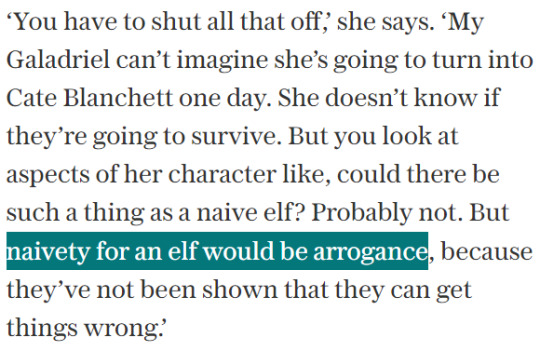
that is perfect for a description of feanor before he departs aman. i don’t believe for a second that he understood the magnitude of the evil he was taking on, what he was condemning his sons and his people to. he trod exactly that same line between naivete and arrogance.
we don’t know much about rop galadriel. she’s clearly got a very different story to tolkien’s galadriel. presumably though they’ll have some similarities. tolkien’s many renditions of galadriel’s origins were obviously inconsistent and patchy, but the latest versions had her making what are framed as some of the best decisions of the noldor: she opposes feanor from the beginning, she plays no part in the revolt, she defends the teleri, she befriends thingol, she is implied to have aided in the escape of elwing to the havens.
rop galadriel is young. she seems too young to have done half of that. but say she has the same knack for sensible and prescient decision-making. say that her life, brief and war-torn as it is, has been characterised by her being constantly right. say that she has none of the wisdom that comes with age and perspective. i can see her becoming arrogant, convinced of her own righteousness.
i could love a galadriel that was explicitly paralled with feanor, both the good and the bad. that could be a really fantastic arc.
103 notes
·
View notes
Note
Hi, i've seen your pretty and angsty edit about Eärien (saving it for a reblog later in the day), the one where you used the quotes "My trouble has been too hard-won" , and i wonder if you have discussed somewhere the meaning of his quote? I've tried to make sense of it using the cast's interviews but so far it's still a mystery for me. She doesn't seem to be the kind of girl that provokes troubles for her family, the rebel kind (she has a career plan and isn't after boys). So what is it?
Oooh yes I love this question! (Also thank you, I'm so glad you enjoyed the edit!).
I interpreted that quote as Eärien letting Kemen know she's not going to be easily distracted or charmed by him (basically "keep your sacred wine, I have no interest in forgetting my troubles"). She's not remotely impressed by him at first lol, and I love that for both of them tbh. I do also think there is some foreshadowing at play.
In terms of the more direct meaning, Eärien has been through a lot for a young Númenórean, and she is wrestling with some major uncertainties in a way Kemen (clearly, to her) isn't. She doesn't have the security/status/wealth he does, she's trying to carve her own way AND hold her family together as best she can after the tragic loss of her mother (and being abandoned, as she or Elendil may perceive it, by Anárion).
In the show, Elendil and his family have recently moved to Armenelos, and Ema Horvath has stated in interviews that Eärien is excited to finally be in the city and at the center of things, but she's also very cautious to be entering this new world. She's ambitious, but it's a very calculated ambition. She's not the sort of person to do things on impulse (unlike Isildur), and I think she's really aware of the risks associated with each step she or her father or brother take. She's less connected to the world of Armenelos, the Queen Regent's court, the guilds, and has the additional burden of being part of a Faithful-aligned family (a burden that lies heavier since she herself is not convinced of the truth or efficacy of those beliefs).
I do think it's important to note Eärien says "my troubles have been too hard won" directly after watching Pharazôn make his speech to the guildsmen, which touched on the tension between the King's Men and the Faithful. It also reminded me of Míriel's response Galadriel in the previous ep, when she said that the men of Númenor were not gifted the island, they earned it. G: "It was because of the elves you were given this island." M: "Our ancestors were not given anything, they paid for this isle with the blood of their kin." I find that parallel interesting because it's clear from ep 3 that Eärien is not a fan of Míriel (she refers to her by her name only, no title, and seems very skeptical of Elendil's involvement with her). There's definitely something to be said about how Míriel's statement can be interpreted as mostly political posturing, and she's playing her cards close to the chest for most of the season, but it's a very clear indication of the general anti-elf sentiment in Númenor at this time, and I think Eärien is very aware of this sentiment as well, whatever her personal beliefs are.
In the context of the whole season, I also think about Elendil's below-deck conversation with Míriel in the finale. M: "My father once told me that the way of the Faithful is committing to pay the price...even if the cost cannot be known. And trusting that, in the end, it will be worth it." E: "Sometimes the cost is clear...we have little choice then but to keep serving, and I for one will see to it that we make the end worth the price." There's definitely a lot to be said about mortality, suffering, loss, who is meant to bear those burdens, and what it means. The "cost" of faith, the presumption that such losses are to be taken in stride, that death is to be considered a gift, vs the position that mortality and the associated expectations are unreasonable or arbitrary at best, cruel and vindictive at worst. I'm really looking forward to the show digging into this tension in future seasons, I'm hopeful we'll see the points to be made on either side, as well as acknowledgement that there are positions which fall between the two extremes (which this post addresses really well imo). Thinking about how Elendil is committed to making Isildur's death "worth the cost," compared with how Eärien is keenly aware of the hardships she's experienced and how they've shaped her outlook and skepticism and work ethic...they both trying to hold it together the only way they know how! And they're kind of on opposite trajectories and can't really see each other clearly! It's a lot!
Based on Ema's interviews, it seems like several of Eärien's scenes which got cut could have provided more context about how her mindset shifts over the season (I am thinking in particular of a dinner scene Ema mentioned where Kemen and Pharazôn were both present, if I can track down the interview she mentioned it in, I will link it below). I get why some of her scenes were cut, but I would love it if there was any way to see them in an extended cut or something…probably wishful thinking though. Anyway, Eärien is a really fascinating character to me and I'm excited to see more of her in s2. They could go a few interesting ways with her, so however it plays out I'm looking forward to writing more Eärien-focused fic and meta.
#kat replies#attheexactlyrighttimeandplace#rings of power#rop meta#rop op#earien#long post#this got a little long-winded sorry#i just have lots of feelings about earien and also numenor#hopefully this is mostly coherent
26 notes
·
View notes
Text
ROP Week 2023 Oct 29: Favorite Original Character
Bronwyn.
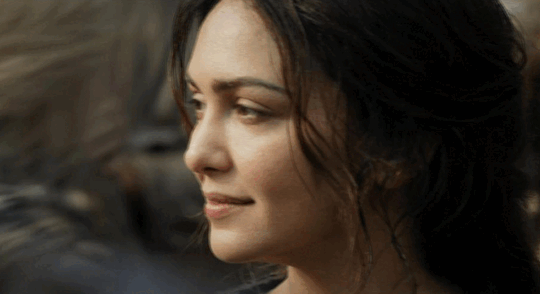
Anyone who's read my Oathbound series knows how much I adore Bronwyn. Bronwyn, the single mother raising a son in a village oppressed by Elves. Bronwyn, the total badass who carried the head of a decapitated Orc all the way to a tavern to prove a point. Bronwyn, the absolute powerhouse of a woman who took on the role of a leader when no one else would, convincing half of of her village to stay and fight even though the chances of survival at the time were close to zero.
Bronwyn, the Southlander who will now lead her people to Pelargir to start anew.
I love her for all of these reasons, but I'm also pretty biased. Why? Because I love Haleth's story in the Silmarillion. I've said it before, but I'll say it again - Bronwyn is the Haleth of the Second Age.
For those who haven't read the Silmarillion: Haleth was the daughter of a leader of the Haladin, one of the three houses of Men that sided with the Elves in the war against Morgoth. During a siege, her father and brother were slain, leaving her with the responsibility of holding her people together.
Haldad had twin children: Haleth his daughter, and Haldar his son; and both were valiant in the defence, for Haleth was a woman of great heart and strength. But at last Haldad was slain in a sortie against the Orcs; and Haldar, who rushed out to save his father's body from their butchery, was hewn down beside him. Then Haleth held the people together, though they were without hope; and some cast themselves in the rivers and were drowned. But seven days later, as the Orcs made their last assault and had already broken through the stockade, there came suddenly a music of trumpets, and Caranthir with his host came down from the north and drove the Orcs into the river.
- The Silmarillion: Of The Coming Of Men Into The West
Sounds familiar?
Caranthir offered the Haladin his protection, but Haleth and her people wanted independence.
When therefore the Haladin had gathered all whom they could find alive of their folk who had fled wild into the woods before the Orcs, and had gleaned what remained of their goods in their burned homesteads, they took Haleth for their chief; and she led them at last to Estolad, and there dwelt for a time. But they remained a people apart, and were ever after known to Elves and Men as the People of Haleth.
- The Silmarillion: Of The Coming Of Men Into The West
Personally, I think the parallels are too obvious to be coincidental. Bronwyn is the Haleth of the Second Age, and I hope that in season two, she will get the title she deserves. Bronwyn, Chief of the Southlanders.
#ropweek2023#rings of power#bronwyn#rop#meta#haleth#the silmarillion#It only occurred to me the other day that I actually never made this post#I thought I'd rambled somewhere about the Bronwyn/Haleth parallels but nope#so here it is#LOVE HER SO MUCH
49 notes
·
View notes